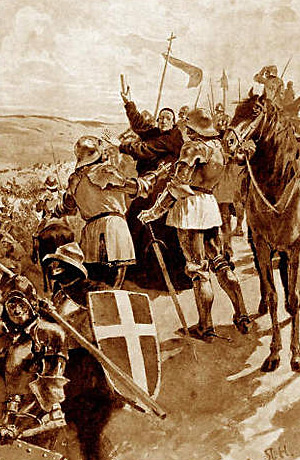Battle of Tachov
This article needs additional citations for verification. (October 2016) |
| Battle of Tachov | |||||||
|---|---|---|---|---|---|---|---|
| Part of the Hussite Wars | |||||||
 Papal legate Henry Beaufort trying to halt fleeing crusaders after the battle | |||||||
| |||||||
| Belligerents | |||||||
|
| |||||||
| Commanders and leaders | |||||||
|
|
| ||||||
| Strength | |||||||
|
17,500 200 War wagons | 20,000 | ||||||
| Casualties and losses | |||||||
| Unknown |
Heavy 900-1,400 captured | ||||||

The Battle of Tachov (German: Schlacht bei Tachau) or Battle of Mies (German: Schlacht bei Mies) was a battle fought on 4 August 1427 near the Bohemian towns of Tachov (Tachau) and Stříbro (Mies). The Hussites won over the armies led by the Cardinal Henry Beaufort of England and Archbishop of Trier Otto von Ziegenhain.[1]
It was part of the Hussite Wars, and it was the first battle in which war wagons were used by the crusaders. The battle showed that the Wagenburg could not be used successfully by just any army. It took an army that knew how to use the wagons to make them successful. This battle ended the Fourth Crusade of the Hussite Wars, and for four years no further crusades were made. This would allow the Hussites to go on their "beautiful rides" into Hungary, Saxony, Bavaria and Silesia.
49°47′43″N 12°37′59″E / 49.79528°N 12.63306°E
References
